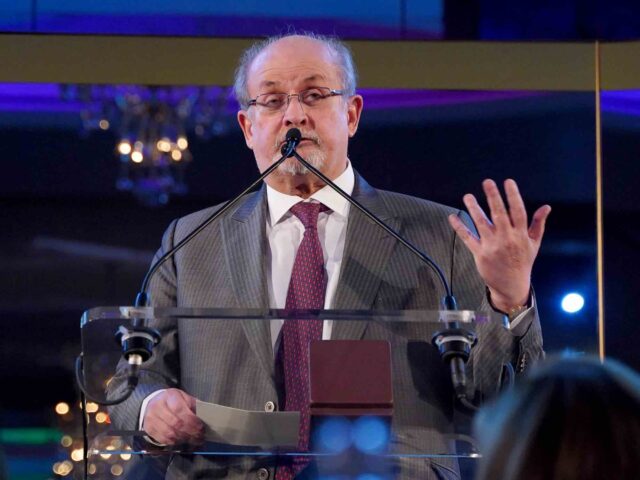When Saudi Arabia secretly murdered columnist Jamal Khashoggi, the media and politicians demanded radical changes in U.S. foreign policy; but even after Iran openly supported the attempted murder of author Salman Rushdie, the Biden administration is given a pass as it persists in negotiations with the Iranian regime.
When Khashoggi was murdered in October 2018, and in the months and years that followed, politicians and prestige media raised hell over the incident — with then-candidate Joe Biden most notably vowing to “punish” Saudi leaders for his death, and promising to make Saudi Arabia a “pariah.”
As then-President Donald Trump pained to advance American foreign policy interests in the Middle East — an effort requiring cooperation from Saudi Arabia — headlines blared condemning and admonishing him and his administration for continuing to work with the Kingdom.
“Trump puts Saudi arms sales above inquiry into Khashoggi killing,” PBS wrote in June 2019, almost a full year after the incident.
“As Jared Kushner Still Fails To Hold MBS Responsible, Jamal Khashoggi Remains Near Top Of 10 Most Urgent Press Freedom Cases,” Forbes lectured in the same month.
“Mike Pompeo didn’t raise Jamal Khashoggi murder in meeting with Saudi king,” the Guardian scolded, also, in June 2019.
Lawmakers in Congress also threw in, with many insisting no meeting with the Saudis could take place in light of the murder, let alone any deals be made.
“Please, they’re sitting across from the person who chopped up a reporter and dissolved his remains in chemicals, and he’s sitting across the chair from the person suspected of leaving that. I don’t see any responsibility for us to protect and defend Saudi Arabia,” House Speaker Nancy Pelosi (D-CA) said of the Pompeo meeting, appearing to use the most explicit and scathing language she could summon.
Senator Tim Kaine (D-VA) demanded the FBI open an investigation into the “state sponsored execution,” despite it taking place thousands of miles away, in Turkey, and having no connection to any matter in the U.S. homeland.
“This investigation is more important than ever to achieve true accountability and justice for this horrific crime,” Kaine said in a letter to FBI Director Chris Wray sent in July, 2019, reported by the Daily Beast.
That same month, Trump administration officials faced bipartisan grilling in the Senate on Saudi Arabia policy, with Sen Bob Menendez (D-NJ) demanding the administration justify any arms sales “after Jamal Khashoggi was literally butchered.”
Sen Jim Risch (R-ID) introduced a bipartisan bill, which he described as a “comprehensive review of the United States-Saudi Relations,” and which aimed to deny visas to some Saudi government officials in light of the incident.
Under mounting pressure, the State Department in December 2019, prevented a Saudi diplomat from entry into America, citing “gross violations of human rights.”
It would be one thing if this attitude was applied evenly to all “state sponsored” killings of writers and intellectuals who draw the ire of Middle Eastern governments, but now the American people are being shown that is not the case.
Last week, British author Salman Rushdie was brutally attacked in Chappaqua, New York, by an American attacker who had become radicalized following a month-long trip to the Middle East, according to his mother.
Rushdie has been under threat since Iranian Ayatollah Khomeini issued a fatwa calling for his head in 1989, citing his book The Satanic Verses as blasphemous. A “semiofficial Iranian foundation” has also offered a $3 million bounty on Rushdie’s head.
His attacker, a 24-year-old man by the name of Hadi Matar, is reported to have become a “religious zealot” on his recent trip, and was found with pro-Iran content filling his social media and phone.
It is still unclear whether Matar is an official agent of Iran — but any reasonable observer can surmise he was inspired by and acting on the fatwa, and would then certainly classify it as a “state sponsored” attempted murder.
Iran is praising the attack, albeit denying involvement, NPR reported Iran sees the attack as justified.
“Regarding the attack against Salman Rushdie in America, we don’t consider anyone deserving reproach, blame or even condemnation, except for [Rushdie] himself and his supporters,” Tehran said in an official statement, according to NPR.
However, as Rushdie remains hospitalized, recovering from a horrific stabbing on American soil, the same lawmakers and media, even including President Joe Biden, remain silent on Iran’s role in the attack, and don’t dare blame the mullahs.
This situation is almost parallel to the Khashoggi incident, but there is one key difference apparently keeping our hectoring moral-betters quiet: the Biden administration is in power now, and happens to be working to hammer out a new iteration of the Iran Nuclear Deal.
The glaring difference in treatment of the two similar incidents in the press — and the different political conditions that surround them — illustrates how these real human rights issues have become casualties of domestic politics and media bias.

COMMENTS
Please let us know if you're having issues with commenting.